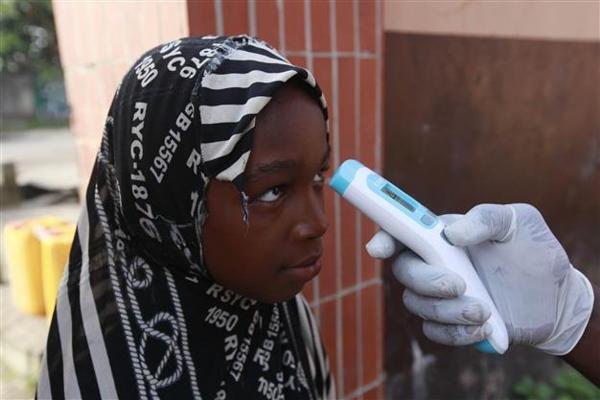Nigeria declared Ebola-free as EU tackles response
LUXEMBOURG - Agence France-Presse


A teacher uses a thermometer to take a students temperature to test for Ebola at Adekunle primary school in Lagos, Nigeria. AP Photo
Nigeria - Africa's most populous country - was declared Ebola-free on Monday as European Union foreign ministers thrashed out measures to help halt the spread of the deadly disease.The World Health Organization said Nigeria's was a "spectacular success story that shows to the world that Ebola can be contained" as the country, where eight people died from the outbreak, defeated the disease.
In another piece of good news in the battle against Ebola, test results show that a Spanish nurse who was the first to have contracted the virus outside Africa has been apparently cleared of her infection.
But the fight was far from over against the outbreak which has claimed more than 4,500 lives, most of them in Liberia, Sierra Leone and Guinea.
In Luxembourg, EU ministers were discussing whether to send a civilian mission to help the three West African countries, as diplomats talked of a "tipping point" in the crisis.
Liberian President Ellen Johnson Sirleaf had warned Sunday that a generation of Africans were at risk of "being lost to economic catastrophe" because of the crisis.
The "time for talking or theorising is over," she said in an open letter published by the BBC.
"This fight requires a commitment from every nation that has the capacity to help -- whether that is with emergency funds, medical supplies or clinical expertise."
The EU foreign ministers will look closely at current efforts and what more needs to be done, not least in getting more skilled staff on the ground in Africa.
One proposal is to reassure medical workers on the Ebola frontline that they will get the back-up and, crucially, Western-level care if they fall sick with a disease for which there is no vaccine nor marketed cure.
Another priority was to ensure that the scattered cases reported so far in the United States and Europe are quickly contained, to prevent Ebola getting a foothold outside west Africa.
"This is a serious and significant problem that we should not underestimate. It's not a problem that will stay in one part of the globe," EU foreign affairs chief Catherine Ashton told reporters on the way into the meeting in Luxembourg.
German Foreign Minister Frank-Walter Steinmeier said the bloc should consider setting up "a civilian EU mission" to west Africa, which would serve as a platform for sending medical staff.
Another diplomat said there were plans for three nations to spearhead global aid to the worst-hit countries: the United States for Liberia, Britain for Sierra Leone and France for Guinea.
A global UN appeal for nearly $1 billion (780 billion euros) has so far fallen short, with only $386 million given by governments and agencies, and a further $226 million promised.
"This is a major health crisis. We have only a short time to get on top of it," British Foreign Secretary Philip Hammond said.
"The only way to stop its spread is to make sure people are isolated and treated earlier."
The Spanish authorities said Sunday that Teresa Romero, a nurse hospitalised on October 6, had now tested negative but must take a second test before she can be declared free of Ebola.
Romero fell ill after caring for two Ebola patients who died at Madrid's Carlos III hospital, in the first known case of transmission outside Africa.
"I am very happy because we can say Teresa beat the disease," Romero's husband Javier Limon said.
In Nigeria, the WHO declared the country free of the disease on Monday after 42 days without any new case.
The Nigeria cases sparked huge alarm amid fears the highly contagious Ebola virus would spread quickly in its teeming cities, making the success in containment even more significant.
US President Barack Obama has cautioned about the danger of panic in Western countries following a series of false alarms in America in the wake of two nurses at a Texas hospital falling ill after treating a Liberian patient who died.
France and Belgium have joined the United States, Britain and Canada in screening air passengers from Ebola-hit countries.
For the moment, however, they have no plans to halt flights, fearing it would be counter-productive as travellers would seek other means of going abroad and possibly hide any exposure, making it harder to monitor and control the virus's spread.
